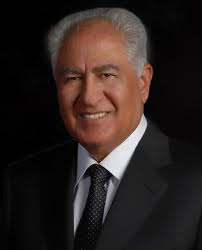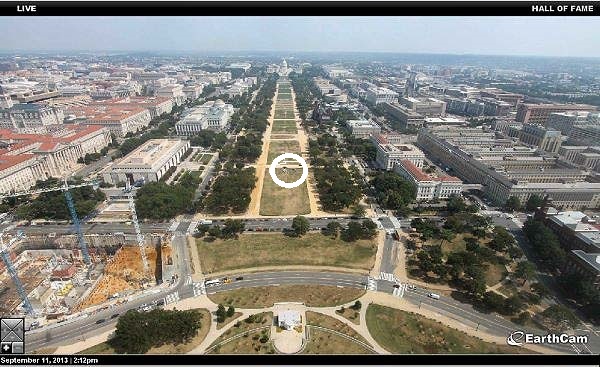Noted economist and former Florida gubernatorial candidate Dr. Farid Khavari exemplifies what thinking ‘outside the box’ is. When politicos in Washington  believe that the government can create wealth by spreading it around, they’re not creating anything, and spreading misery. Government doesn’t create wealth, it consumes it.
believe that the government can create wealth by spreading it around, they’re not creating anything, and spreading misery. Government doesn’t create wealth, it consumes it.
Dr. Khavari explains how free-market capitalism and political leadership, as opposed to government control and dependency, can lift up all boats, reduce poverty, and increase both personal and national wealth. Here’s how . . .
CREATING ECONOMIC SECURITY FOR EVERYONE DOES NOT COST, IT PAYS
Farid A. Khavari, Ph.D.
A baby born today may live 90 years or more. Ideally, that baby would grow up healthy, get a good education, get a good job, and earn enough to live a good life and to save for a comfortable retirement. By working at a wealth-creating job, that person earns and spends money, generating more economic activity than he or she earns each year. In doing so, this baby will contribute far more to the economy than he or she costs, adding to the net wealth of the economy. The economy can continue to grow and provide opportunities for millions of other babies.
Or maybe the baby will eat a poor diet, get a poor education, join the growing millions of permanently unemployed, and suffer health problems as well. In place of his or her contributions to the economy, we have social costs which reduce the net wealth of the economy: health care, unemployment and welfare, perhaps even a prison term that can cost more than a Harvard education.
Creating and maintaining an economy where everyone can earn and enjoy economic security for life is not only desirable, it is possible, and it costs much less than having a growing proportion of the population destitute and dependent on government. In fact, ultimately it costs nothingto create such an economy. And ultimately, no other kind of economy is sustainable anyway.
Virtually every nation in the world has the necessary resources to create an economy where national and personal wealth grows and every person lives a dignified and secure life. Willing workers, technology and materials are primary ingredients for wealth creation, and they are abundant. All that is necessary is the will to do it and a plan to make it happen.
How is this possible, and why don’t we have it now? We have brilliant economists and honest politicians who care about us, don’t we? One ingredient missing in every economy is common sense.
What makes every major economy today unsustainable is simply consuming more wealth than is created. Building a house, or manufacturing almost anything, creates wealth. Trading stocks and other financial activities at best transfer existing wealth from one party to another and at worst divert wealth from wealth-creating activities. Costs like interest, health care, insurance and government consume wealth. In order to be sustainable, an economy must create more wealth than it consumes.
The economic situation today is the result of a long term trend away from wealth-creating jobs to more wealth-consuming jobs. Each year we have less manufacturing and construction jobs (and the jobs that support these and many other wealth-creating activities), shifting to more financial, health care, and government jobs — and more unemployment — all of which consume net wealth in the economy.
Everyone’s life has plenty of costs: food, shelter, clothing, health care, energy, insurance, taxes, and on and on. Ideally, everyone’s income would cover the costs with enough left over to enjoy life and save for a secure retirement. In fact, incomes are shrinking as costs of every kind rise faster and faster, while millions are unemployed. When people cannot earn enough to pay these costs themselves, ultimately private costs become social costs, which put a further burden on working taxpayers and further reduce the net wealth of the economy.
There are more opportunities to create wealth in our economy than is generally understood.
Let’s look at eight elements of a healthy, sustainable economy, which provide the opportunity for economic security for everyone, comparing the wealth-increasing benefits of having them and the rising costs of not having them. Then we can see how we can have such an economy at much lower cost.
1. Jobs for all willing workers, with good pay. We need more wealth-creating jobs and less wealth-consuming jobs. Wealth-creating jobs create more jobs. To the extent that people cannot earn enough for themselves, society must make up the shortfall. We can either pay the social costs, or enjoy the benefits of wealth-creating jobs, which cost nothing to create and dramatically reduce social costs.
2. Affordable home-ownership available to everyone. This means short-term, low-interest financing in a stable market, so one does not slave for 30 years to own a home. Rising housing prices are not a sign of “economic recovery”, they are a sign of inflation. Eventually prices rise until no one can afford to buy, then the bubble pops and starts over again. Every dollar paid for mortgage interest is a dollar that cannot be spent into the economy to create more wealth, or saved for retirement. What is a greater component of economic security than owning a home free and clear?
3. Affordable health care for everyone. Eventually, everyone needs health care, but every dollar spent on health care consumes wealth in the economy. There are huge opportunities for reducing costs while improving quality of care and outcomes. This is obvious when we see high-cost countries like Switzerland spending half of what the U.S. spends, with better results. What are not obvious are the tremendous opportunities for wealth-creating jobs which improve health care while reducing costs.
4. Free education from kindergarten through university or trade schools—and continuing education and training for adults who need jobs. Too many people cannot earn what they need, or contribute to the net wealth of themselves and the economy, because they cannot afford sufficient education. The result is higher social costs. Ironically, a university education still costs less than incarceration. The wealth not added to the economy due to lack of education is incalculable. Those who somehow manage to get higher education end up an average of $35,000 in debt—and will ultimately pay twice that or more including interest. We can be sure that people with a trillion dollars of student loans to pay are not buying many houses or new cars. If that money were available for spending or saving, the added social costs of free higher education would be repaid by trillions of dollars of wealth creation and the resulting decrease of total social costs.
5. Free energy though decentralized solar, wind and other alternatives for homes and businesses. Energy costs are constantly rising, consuming more wealth in the economy. The costs of not having free energy are clear to every homeowner and businessperson when they pay the monthly bills. What is not easy to calculate is the impact on the economy of spending money on energy rather than on products, services and savings. We spend more than almost half a trillion dollars each year on electricity. As more electric cars become available, more opportunities for savings are created—and more opportunities for wealth-creating jobs as well.
6. A financial safety net for the disabled, the unemployed, and those who really need it. We can improve on what we have, and save money not by reducing benefits but by creating an economy where less people need the safety net.
7. Protection from disasters and destructive events which can cause people financial ruin: a form of insurance.
8. A secure and dignified retirement for everyone. People who have earned economic security throughout their lives, own their homes and have saved for retirement create a lot less social cost than people who struggled at minimum wages all of their lives. A sustainable economy as described above is much better for people, and for society, than one where senior citizens are hungry.
This is not some socialist Utopian vision. In fact, any economy can become sustainable more easily if government’s role is leadership rather than ownership. A robust private sector creates more wealth than any government enterprise.
How can we achieve this?
The good news is that a wealth-creating job eventually creates more wealth than it cost to create the job. We can have as many wealth-creating jobs as we want, at zero net cost. Further, each wealth creating job causes more jobs to be created, and so on. The key is that wealth-creating activity must be greater than wealth-consuming activity.
The better news is that there are opportunities today to create millions of “SUPER-JOBS” which can multiply and accelerate wealth creation in the economy. A “SUPER-JOB” is a wealth-creating job which provides a product or service which reduces costs for the customer.
Anyone—even economists!—can understand that we can create wealth by manufacturing or building things. When people work at such wealth-creating jobs, the economy has more wealth at the end of the day than it did in the morning.
But what economists overlook is that we can create even more net wealth for the economy and everyone in it by reducing costs. In the case of building a house, for example, the house maintains its value over time, and generally can be sold for enough to buy another house. But if the house has a solar system on the roof and reduces energy costs by $100 per month, in time the solar system pays for itself several times over—adding more net wealth to the owner and the economy than it cost.
Every dollar not spent for some kind of cost is available for spending or saving, which benefit both the individual and the economy. This means that many activities which are currently wealth-consuming can be partially transformed into wealth-creating ones. Reducing permanent costs like insurance, interest, health care, education, and many more through innovation and efficiency provides countless opportunities to create new wealth for individuals and the economy—and countless job opportunities, too.
Here is a simple example of how government leadership –not government money—can create SUPER-JOBS in the private sector, without subsidies or giveaways.
Let’s say the governor of Florida presents a program calling for half of Florida’s 9,000,000 households to acquire a solar water heater within 10 years. That calls for about 500,000 solar water heaters per year. The governor announces that in such volumes, a fair price can be guaranteed for all such systems manufactured in Florida, and that XYZ Bank is offering low-interest financing so that people can acquire these solar heaters for a monthly payment equal to their savings on electricity.
Manufacturers would rush to Florida to meet the demand. Over 15,000 good jobs would be created in manufacturing and installation. Those 15,000 workers will earn over half a billion dollars per year, and drive five billion dollars or more per year in new economic activity in the state. This in turn creates tens of thousands of more new jobs and many billions of dollars more in activity each year.
This program costs the government of Florida nothing–but how much does the government gain when more people are employed and pay more taxes? And how many billions of dollars in social costs will ultimately be saved by this one simple program?
Now apply these principles of Zero Cost Economics in other ways and in every state. Announce that thousands of the vehicles the state buys each year will be electric vehicles manufactured in the state. Add solar electric carports to replace the cost of gasoline. The list is as endless as the opportunities. Government takes a leadership role and organizes demand, while the private sector invests in providing the products and services.
Any government could apply these concepts instantly and at zero net. Whether by legislation or simple executive policy decisions, millions of jobs can be created and the balance can tip from wealth-consuming back to net wealth creation. We can have economic security for everyone, much cheaper than the alternative.
However, the principles of Zero Cost Economics can be applied by the private sector in any country without waiting for government action. This described in a brief paper, “The Zero Cost Cities Project.”

You can request a copy via email at fk@zerocosteconomy.com , or get a free download of the book Towards a Zero Cost Economy from www.zerocosteconomy.com . Farid A. Khavari, Ph.D. is noted economist and author of ten books, including the classic Environomics, and numerous articles.
 Which means, they haven’t ruled out ‘Jewish lightning.’ Also known as arson. Not to be anti-Semitic or anything, that’s just what it’s called there.
Which means, they haven’t ruled out ‘Jewish lightning.’ Also known as arson. Not to be anti-Semitic or anything, that’s just what it’s called there.



 believe that the government can create wealth by spreading it around, they’re not creating anything, and spreading misery. Government doesn’t create wealth, it consumes it.
believe that the government can create wealth by spreading it around, they’re not creating anything, and spreading misery. Government doesn’t create wealth, it consumes it.